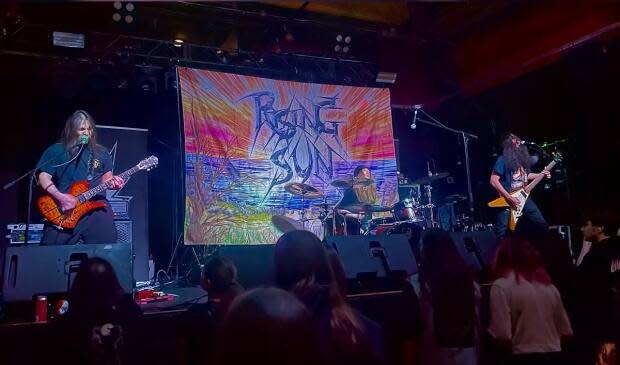Healing through heavy metal: Edmonton family shares ALS journey

After losing his mother, Kai Sakaguchi copes with grief by performing with his thrash heavy metal band, Rising Sun.
He founded the group in 2018, months after Susann Sakaguchi died from amyotrophic lateral sclerosis (ALS).
The fast, percussive guitar rifts he writes and the local metal music scene have helped him reconnect with others.
"After she died, I was kind of bitter for a while," said Kai.
"Once my band started, then I got more social because I had to be."
Susann was diagnosed with ALS in 2014. She died three years later, leaving behind sons Kai and Kyo, as well as her husband, Hajime Sakaguchi, a teacher.
Kyo hopes his family's story will help more people understand the disease.

The ALS Society of Alberta has been fundraising since 1986, but he said people still ask him to explain how his mother died.
"It's kind of annoying," said Kyo.
On Saturday, other families will walk around Edmonton's Rundle Park dressed in purple to raise money for ALS research. The ALS Society of Alberta hosts the Walk Together for ALS event every June.
Roughly 3,000 Canadians live with ALS at any given time. The disease is degenerative and affects muscle movement.
According to the ALS Society of Canada, life expectancy after symptom onset is two to five years.
The disease is commonly known as Lou Gehrig's disease, after the Hall of Fame baseball player whose career was cut short in 1939.
Hajime is a longtime baseball player and coach, and said Gehrig's legacy impacted his perspective on the diagnosis.
"I just knew that she was going to die like 100 per cent," he said. "I have read Lou's story."
The family said Kai, who was 13 when his mother was diagnosed, shouldered many of the caretaking duties.
He remembers brushing Susann's teeth, preparing her medications and translating her slurred speech, which he could discern more quickly than the rest of the family.
Kyo, 9 at the time of his mother's diagnosis, remembers filling his mom's feeding tube and pushing her wheelchair.
"I kind of feel bad for my brother because he did a lot," said Kyo.
Despite Susann's physical challenges as the disease progressed, Hajime said the family found happiness toward the end of her life.
"I bought new wedding rings … I really enjoyed the last year," he said.
"I was ready to let her go."
After she died, the family home, previously busy with care workers and nurses, felt empty, according to Hajime.
The family decided to continue living in the house, then fitted with adaptive-living aids like a chair lift and lift swing.
Much of the equipment is gone, but scratches on the walls from the equipment and other evidence from Susann's experience with ALS are still strewn about the property.
"Now I'm glad to see the proof that she was here," said Hajime.

Hajime and Kyo still live in the house. This spring, Kyo finished his second year playing university-level baseball for Douglas College in B.C.
Kai's band, Rising Sun, will release their first album on Sept. 15. The 23-year-old works as a sushi chef, but dreams of making a living through music.
"I could die at any time," said Kai. "So I don't want to waste time doing something I don't want to do."
Hajime has spent years worrying about his kids' mental health since his wife's death. But like his son, he has a similar takeaway from the journey.
"You don't know what's coming next," he said. "If you want to [do it], you have to do it now."


